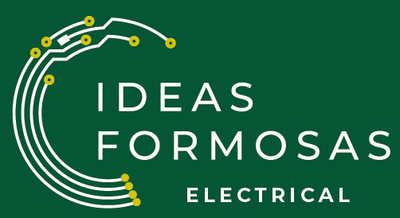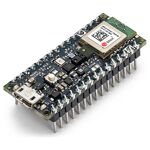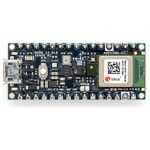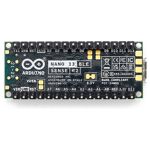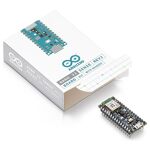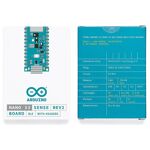Description
The 3.3V Arduino NANO 33 BLE SENSE REV2 board was specially designed for AI, with an extra small format this board includes a set of sensors that will allow you, without any external hardware, to start programming your next project immediately.
This compact and reliable Nano board is built around the NINA B306 module for BLE and Bluetooth 5 communication; the module is based on the Nordic nRF 52840 processor which contains a powerful Cortex M4F and the board has a complete set of sensors that allow the creation of innovative and highly interactive projects.
Its architecture, fully compatible with Arduino IDE Online and Offline, has a 9-axis Inertial Measurement Unit (IMU), temperature, pressure, humidity, light, color and even gesture sensors and a microphone that are managed through the specialized libraries. Its power consumption is greatly reduced compared to other boards of the same size, combined with the Nano form factor, it opens up a wide range of applications.
This allows the design of wearable devices and gesture-based projects that need to communicate with other devices at a short distance. The Arduino Nano 33 BLE Sense is ideal for interactive automation projects thanks to the BT 5.0 multiprotocol.
With the Arduino Nano 33 BLE Sense Rev2 in combination with the integrated sensor, you can:
- Build wearable devices that, using AI, can recognize movements.
- Build a room temperature monitoring device that can suggest or modify changes to the thermostat.
- Build a gesture or voice recognition device using the microphone or gesture sensor along with the board's AI capabilities.
The main feature of this board, in addition to the complete selection of sensors, is the possibility of running Onboard Computing (AI) applications on it using TinyML. Learn how to use the Tensor Flow Lite library by following these instructions, or learn how to train your board using Edge Impulse.
Technical Specifications:
- Microcontroller: NINA-b3 (nRF52840)
- Clock: 64MHz
- Memory: Flash:1MB / RAM:256KB
- Connectivity: Bluetooth Low Energy 5.0
- Interfaces: USB / SPI / I2C / I2S / UART
- Voltages: Input- USB: 5V / Input-VIN: 4.5-21V / Operational: 3.3V
- Pinout: 14:Digital / 6:PWM / 8:Analog
- Dimensions:: 44mm x 18mm x 4.2mm
- IMUs axis sensor: IMU270: 6 axes / BMM150: 3 axes
- Barometric pressure sensor: LPS22HB
- Temperature and humidity sensor: HS3003
- Digital proximity, ambient light, RGB and gesture sensor: ADPS-9960
- Digital microphone: MP34DT05
- Cryptographic chip: ATECC608A
Attention: Arduino Nano 33 BLE Sense only supports 3.3VI/Os and is NOT 5V tolerant, so make sure you are not directly connecting 5V signals to this board or it will be damaged. Furthermore, unlike Arduino Nano boards that support 5V operation, the 5V pin does NOT supply voltage but is instead connected, via a jumper, to the USB power input.
| Pin | Function | Type | Description |
| 1 | D13 | Digital | GPIO |
| two | +3V3 | Power Out | Internally generated power output to external devices |
| 3 | AREF | Analog | Analog Reference; can be used as GPIO |
| 4 | A0/DAC0 | Analog | ADC in/DAC out; can be used as GPIO |
| 5 | TO 1 | Analog | ADC in; can be used as GPIO |
| 6 | A2 | Analog | ADC in; can be used as GPIO |
| 7 | A3 | Analog | ADC in; can be used as GPIO |
| 8 | A4/SDA | Analog | ADC in; I2C SDA; Can be used as GPIO (*) |
| 9 | A5/SCL | Analog | ADC in; I2C SCL; Can be used as GPIO(*) |
| 10 | A6 | Analog | ADC in; can be used as GPIO |
| 11 | A7 | Analog | ADC in; can be used as GPIO |
| 12 | VUSB | Power In/Out | Normally NC; can be connected to VUSB pin of the USB connector by shorting a jumper |
| 13 | RST | DigitalIn | Active low reset input (duplicate of pin 18) |
| 14 | GND | Power | PowerGround |
| 15 | VIN | Power In | Vin Power input |
| 16 | TX | Type | USART TX; can be used as GPIO |
| 17 | RX | Digital | USART RX; can be used as GPIO |
| 18 | RST | Digital | Active low reset input (duplicate of pin 13) |
| 19 | GND | Power | PowerGround |
| 20 | D2 | Digital | GPIO |
| 21 | D3/PWM | Digital | GPIO; can be used as PWM |
| 22 | D4 | Digital | GPIO |
| 23 | D5/PWM | Digital | GPIO; can be used as PWM |
| 24 | D6/PWM | Digital | GPIO; can be used as PWM |
| 25 | D7 | Digital | GPIO |
| 26 | D8 | Digital | GPIO |
| 27 | D9/PWM | Digital | GPIO; can be used as PWM |
| 28 | D10/PWM | Digital | GPIO; can be used as PWM |
| 29 | D11/MOSI | Digital | SPI MOSI; can be used as GPIO |
| 30 | D12/MISO | Digital |
SPI MISO; can be used as GPI |
At the bottom of the board, under the communication module, the debug signals are organized as 3x2 test blocks with a pitch of 2.54mm. Pin 1 is the bottom left with the USB connector on the left and the test pads on the right. This board comes with 2 rows of header pins included.
| Pin | Function | Type | Description |
| 1 | +3V3 | Power Out | Internally generated power output to be used as voltage reference |
| two | SWD | Digital | nRF52480 Single Wire Debug Data |
| 3 | SWCLK | DigitalIn | nRF52480 Single Wire Debug Clock |
| 5 | GND | Power | PowerGround |
| 6 | RST | DigitalIn | Active low reset input |
